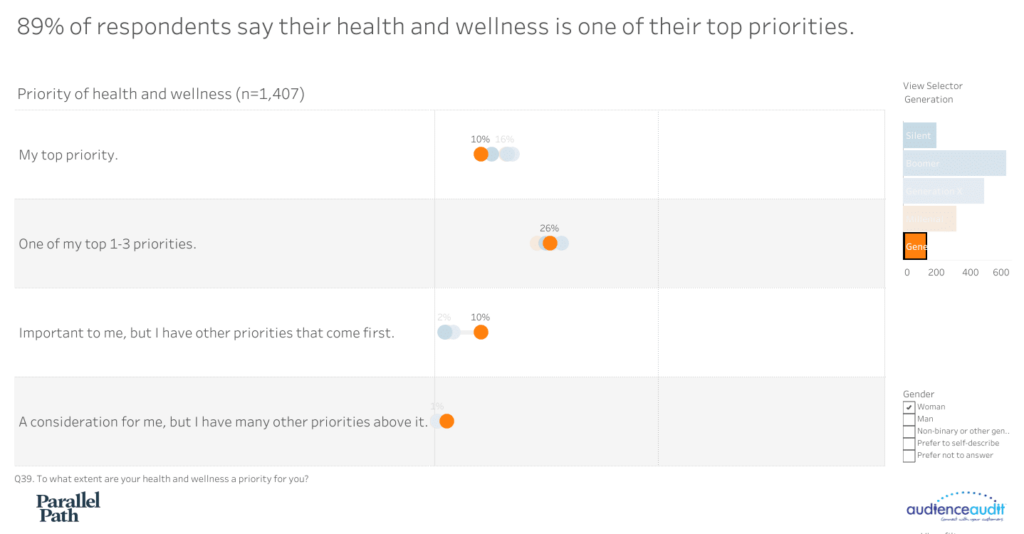In today’s fast-paced world, the landscape of health and wellness is constantly evolving, driven by the diverse needs and perspectives of different demographic groups. Among these, Gen Z women stand out as a formidable force, shaping trends and influencing conversations around holistic well-being. Shaped by digital technology and evolving societal norms, Gen Z as a generation brings a fresh perspective to this industry that challenges conventional approaches as they strive to prioritize their health and wellness.
Yet, as this group navigates the complexities of their well-being journey, they are faced with a healthcare system and brands that often fall short of meeting their needs, leaving them juggling multiple responsibilities and struggling to find holistic support. Understanding their unique attitudes and behaviors becomes paramount for brands seeking to engage authentically and effectively.
The Gen Z Health & Wellness Experience
Gen Z, often regarded as the information generation, are uniquely positioned in the digital era, where access to vast resources begins at an early age. With unprecedented access to information, Gen Z women in particular navigate a digital landscape inundated with health-related content, shaping their views and perspectives on their overall well-being. However, alongside this wealth of information lies an equally formidable challenge—misinformation.
This overload of options and disguised marketing misinformation doesn't lead Gen Z towards better health; instead, it fosters dismissiveness and confusion, worsening feelings of anxiety and uncertainty already prevalent in this generation.
McKinsey’s research and the 2024 World Happiness Report reveal that this generation reports poorer mental, social, and spiritual health than older generations, with female Gen Zers almost twice as likely to report poor mental health compared to males. Social media plays a significant role, with more female Gen Zers acknowledging its negative impact on the fear of missing out (FOMO), body image, and self-confidence.

Our Parallel Path consumer study found that only 7% of Gen Z women rate their health as ‘Excellent,’ while 26% consider health a ‘Top 3 Priority.’ Their top three health and wellness priorities are fitness, sleep, and overall health, respectively, indicating a desire for a balanced approach to well-being. Gen Z views healthcare as self-care, with a strong emphasis on mental health, digital health tools, and alternative treatments. They are proactive in addressing mental health, with a high percentage using therapy and discussing mental health in the workplace.
However, while Gen Z women are actively prioritizing their overall health and wellness, an Oliver Wyman study identifies a significant disparity between their low percentage of healthcare spending in relation to their population size. This is partly due to their younger age and relatively better health, but also reflects a limited household income and lack of transparency when it comes to health and wellness solutions.
Why this Matters for Brands
22% of Gen Z women believe that health and wellness brands have a higher responsibility to connect with their customers. This statistic alone reflects a call for a new era of authenticity from health and wellness brands. However, despite their efforts to prioritize their health, Gen Z women often find themselves bombarded with misleading information from brands more focused on sales than genuine support.
This disconnect between what Gen Z women need and what brands offer highlights a critical gap in the industry that must be addressed.
To effectively resonate with Gen Z women, brands must embrace:
- Responsibility and Advocacy: Brands that take an active role in advocating for better health and wellness can resonate more with Gen Z women. This could involve partnerships with health organizations, community initiatives, and transparent communication about health and wellness efforts.
- Authentic Engagement: With 22% of Gen Z women expecting health and wellness brands to connect on a deeper level, authenticity is key. Brands need to communicate genuinely, showing a real commitment to supporting their customers’ well-being.
- Holistic Offerings: Gen Z women prioritize fitness, sleep, and overall health, seeking brands that acknowledge the interconnectedness of physical, mental, and emotional well-being. While it may not be feasible for a singular brand to offer a comprehensive suite of solutions, it’s essential for brands to be cognizant of the full spectrum of a woman’s health journey and strive to address multiple aspects where possible.
- Leveraging Digital Tools: With 66% of Gen Z using wellness apps and fitness trackers, brands should integrate digital health tools into their offerings. This not only meets the technological expectations of this generation but also helps in providing personalized health solutions.
- Mental Health Support: Given the high rates of anxiety and depression among Gen Z women, brands should prioritize mental health in their messaging and services. Providing resources, support, and destigmatizing mental health can build stronger connections with this demographic.
Navigating the Path Forward
Understanding the health and wellness priorities of Gen Z women is crucial for brands aiming to connect with this expanding influential demographic. By addressing their specific needs and expectations, brands can not only foster meaningful relationships and drive engagement, but also help contribute to improving the health and wellness for this generation as a whole as they move forward in their life journey. At Parallel Path, we take this as a call to action for brands to address the need for a holistic, authentic, and proactive approach to health and wellness marketing.
